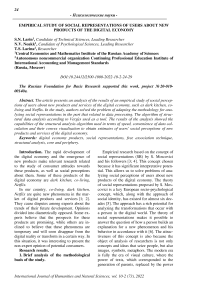Empirical study of social representations of users about new products of the digital economy
Автор: Larin S.N., Noakk N.V., Larina T.S.
Журнал: Международный журнал гуманитарных и естественных наук @intjournal
Рубрика: Психологические науки
Статья в выпуске: 10-2 (73), 2022 года.
Бесплатный доступ
The article presents an analysis of the results of an empirical study of social perceptions of users about new products and services of the digital economy, such as dark kitchen, co-living and Netflix. In the study, authors solved the problem of adapting the methodology for analyzing social representations in the part that related to data processing. The algorithm of structural data analysis according to Vergès used as a tool. The results of the analysis showed the capabilities of the structural analysis algorithm used in terms of speed, convenience of data calculation and their convex visualization to obtain estimates of users' social perceptions of new products and services of the digital economy.
Digital economy products, social representations, free association technique, structural analysis, core and periphery
Короткий адрес: https://sciup.org/170196565
IDR: 170196565 | DOI: 10.24412/2500-1000-2022-10-2-24-29
Список литературы Empirical study of social representations of users about new products of the digital economy
- Becar will build the largest co-living in the world [Electronic resource] https://fhttps://fbss.ru/becar-postroit-samyj-krupnyj-koliving-v-mire/polezno-znat/.
- Dark kitchen - restaurants of the future or a crutch in a crisis? [Electronic resource] https://f.partnerkin.com/blog/allinfo/dark_kitchen.
- Flament C. Pratiques et représentations sociales // Perspectives cognitives et conduites sociales. - 1987. - Т. 1. p. 143-150.
- Moscovici S. The phenomenon of social representations // Social representations / Ed. by R.M. Farr, S. Moscovici. Cambridge: Cambridge University Press, 1984. P. 3-69.
- Bovina I.B., Dvoryanchikov N.V. A person in a digital society: the explanatory potential of one socio-psychological theory [Electronic resource] // Psychology and law. 2020. Vol. 10. № 3. P. 143-157.
- Tateo L. Représentations sociales et nouvelles technologies. In: G. Lo Monaco, S.Delouvée, P.Rateau (eds.). Les représentations sociales. Théories, méthodes et applications. Louvain-la- Neuve: De Boeck Supérieur. 2016. P. 399-408.
- Bovin B.G., Bovina I.B. Crime and its participants in the social representations of student youth // Electronic' target='_new' rel='nofollow'>www.psyedu.ru'>Electronic journal "Psychological science and education". 2013. № 3. P. 222-233.
- Kostina T.A., Larin S.N., Noakk N.V. Development of a method for analyzing statements as a tool for measuring social perceptions of users about the products of the digital economy // Eurasian Union of Scientists, 2019. № 5(62), P. 60-65.
- Sternin I.A., Rudakova A.V. Dictionary definitions and semantic analysis. Voronezh. Istoki. 2017. - p 34.
- Lahlou, S., Abric, J-C. What are the "elements" of a representation? // Papers on social representations. Volume 20, pages 20.1-20.10. 2011.


